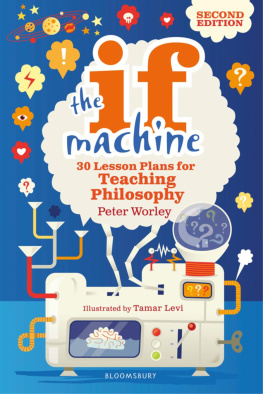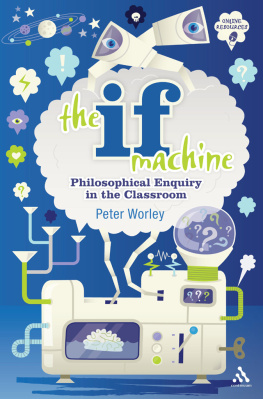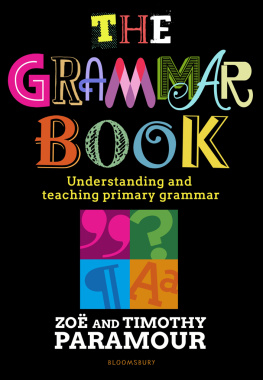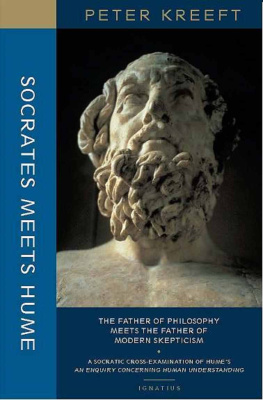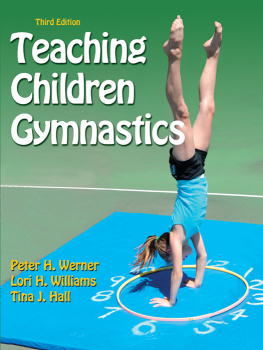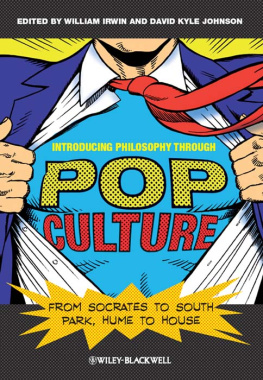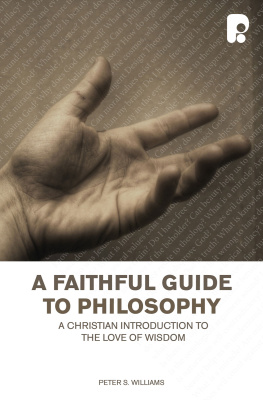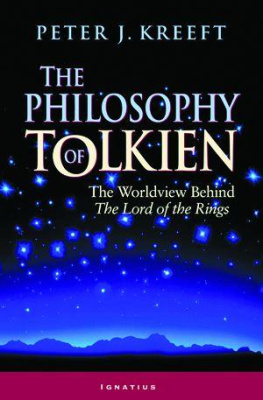Content

Praise for The If Machine
This is a timely and valuable contribution: a capacity to think critically is the key component of any education, and Worley is an inventive enhancer of childrens ability to think for themselves.
Professor A.C. Grayling, Master of New College of the Humanities
a lucid and well-thought-through resource that should have children entertained and educated at the same time.
Dr Stephen Law, Senior Lecturer, Heythrop College, University of London
Philosophy with my Year 6 class was a revelation. Children who had never felt confident enough to speak up came out with such insightful comments that others had no choice but to start to take them seriously. Every school should have philosophy as part of the curriculum.
Amanda Crook, Primary Teacher
If you had any doubts about whether you could do this, this book gives you the confidence to be able to go out and do it.
Julie Odege, Primary Teacher
A very well-organised and thought-out book One of the most striking things about this book is its intellectual rigour, its grounding in the work of real philosophers and its implicit belief that children will respond to big and important ideas.
Martin Spice, Times Educational Supplement
Peter is skilled at making a potentially complex subject as accessible as it could be Each session is clearly laid out, graded for difficulty as well as age-suitability, and accompanied with information about the relevant philosophical question.
Teach Primary
Other titles from Peter Worley
100 Ideas for Primary Teachers: Questioning
40 Lessons to Get Children Thinking
Once Upon an If
The If Odyssey
BLOOMSBURY EDUCATION
Bloomsbury Publishing Plc
50 Bedford Square, London, WC1B 3DP, UK
BLOOMSBURY, BLOOMSBURY EDUCATION and the Diana logo are trademarks of Bloomsbury Publishing Plc
First published in Great Britain 2011 by Continuum International Publishing Group
This edition published in 2019 by Bloomsbury Education
Text copyright Peter Worley, 2011, 2019
Illustrations copyright Tamar Levi, 2011, 2019
Peter Worley has asserted his right under the Copyright, Designs and Patents Act, 1988, to be identified as Author of this work
Bloomsbury Publishing Plc does not have any control over, or responsibility for, any third-party websites referred to or in this book. All internet addresses given in this book were correct at the time of going to press. The author and publisher regret any inconvenience caused if addresses have changed or sites have ceased to exist, but can accept no responsibility for any such changes
All rights reserved. No part of this publication may be reproduced or transmitted in any form or by any means, electronic or mechanical, including photocopying, recording, or any information storage or retrieval system, without prior permission in writing from the publishers
A catalogue record for this book is available from the British Library
ISBN: PB: 978-1-4729-6908-8; ePDF: 978-1-4729-6907-1; ePub: 978-1-4729-6906-4
To find out more about our authors and books visit www.bloomsbury.com and sign up for our newsletters
For my parents, Ian and Lorraine, and my parents-in-law, Chris and Jocelyn, whose support, at different times, has been invaluable.
Education to independence demands that young people should be accustomed early to consult their own sense of propriety and their own reason.
G.W.F. Hegel (17701831)
Contents
A companion website to accompany this book is available online at: www.bloomsbury.com/if-machine-2e
Please visit the link to access the downloadable resources.
Thank you, once again, to Hannah Marston, who has been a more-than-brilliant editor (hand on heart!) and to the rest of the Bloomsbury team. Thanks must go to Melanie Wilson, who, back in 2009, commissioned the first edition of this book for Continuum, and who helped to conceive the original book that was so well received. I would also like to thank Caroline Schaffalitzky de Muckadell, whose notes, probing questions and suggestions for the recent Danish version of The If Machine ( Tnk hjt med dine elever ) led to a good deal of the changes and improvements to the second edition. In particular, the troubleshooting table (). The support of The Philosophy Foundations core team (Steve Hoggins, Joseph Tyler and Emma) cant be overestimated. I would also like to say thanks to the entire team at The Philosophy Foundation and the various volunteers who have given up their time to add to the support Ive received.
Equally, I would like to thank other organisations and individuals who have inspired my work and continue to do so: Catherine McCall (CoPI, EPIC), Pieter Mostert, Joseph Oyler (IAPC), Jason Buckley (The Philosophy Man), Grace Lockrobin, ne Robinson (Thinking Space), Roger Sutcliffe (Dialogue Works), Joanna Haynes and Karin Murris, Oscar Brenifier, David Shapiro, Thomas Wartenberg, Susan Gardner, Michael Hand, Laura DOlimpio, Tim Sprod, Philip Cam, Georgina Donati, Andy West, Steven Campbell Harris, Marsali Grey, Ellen Fridland, M.M. McCabe, Peter Adamson, Eva Hoffman and Michelle Sowey. And, of course, Socrates, Plato, Matthew Lipman and Ann Sharp, John Locke and Janusz Korczak.
And those who helped bring forth the first edition: Kathy Palmer, Julie Odege, the late Amanda Crook, Annette Gordon, Oliver Leech, Robert Torrington, Ruth Oswald, Andrew Day and Miriam Cohen Christofidis.
And thank you to Tamar Levi for the wonderful illustrations to this and many of my other books.
In the preface of the first edition of this book, I likened doing philosophy to entering a labyrinth by drawing an analogy with the ancient Greek story of Ariadne and Theseus. The children were identified with Theseus, who enters the labyrinth (philosophy) in the story, and Ariadne represented the facilitator in two important ways: she provides Theseus with what he needs (a wooden unthreading device called a clew) to navigate his way around the labyrinth. But Ariadne is importantly not with Theseus when he does so. She therefore offers two central themes of facilitation that run, like threads, throughout this book: i) presence , the extent to which the facilitator acts to impact on the discussion, and ii) absence , the extent to which the facilitator does not act, or refrains from acting, to impact on the discussion. What I didnt say then was that facilitation itself can feel like entering a maze! The art of good facilitation is about getting the balance between these two principles right.
Nearly ten years have elapsed since the publication of the first edition of The If Machine (and my first book). Eight nearly nine books later and a lot has happened since then, both in terms of The Philosophy Foundation and in terms of the ideas in the book. However, it is remarkable how many of the ideas central to The Philosophy Foundations approach to doing philosophy in schools and other public settings were captured in that first edition. Even the most important addition to our approach since then, open questioning mindset (see below and ), is only new in name; its spirit runs throughout the books first edition.
Since writing the first edition, I have done a lot of training for people to be able to run the sessions from this and my other books. Here are some of the insights I can offer from my experience of training philosophers and teachers for anyone approaching this book for the first or the fiftieth time. Firstly, both teachers and philosophers can do this stuff. Philosophers we train need to learn sufficient pedagogy; teachers, sufficient philosophy. But in both cases adopting the right mindset makes everything else fall into place more easily and, perhaps most importantly, it means that there is less work for facilitators to do. So, it is the mindset that is the most important thing to get right, more specifically, an open questioning mindset (OQM).

